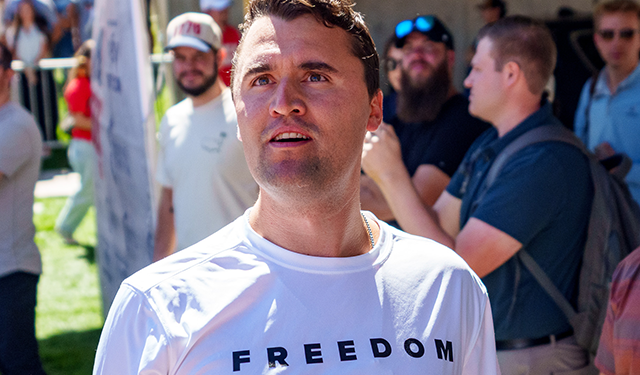Faith, sacrifice, and the high price of leadership came into full view this week as Erika Kirk revealed the powerful, heartbreaking details of her husband’s final moments. She now wears his pendant of Saint Michael the Archangel — the warrior who cast Satan out of Heaven — still marked by Charlie’s blood from the day he was assassinated. The small cross was ripped from his chest by medics as they worked to save his life after the shooting at a Turning Point USA event in Utah on September 10.
In a candid interview, Erika described the eerie sense of foresight her husband carried. Charlie often spoke of the possibility of dying violently, a reality that comes with challenging the cultural establishment, defending faith, and mobilizing young people toward conservative values. “Ms. Kirk, like several of her husband’s subordinates, had occasionally heard him imply that his life could be cut short by violence. She found herself wondering if a part of him had already surrendered to such a prospect,” the report noted.
The night before the shooting, Charlie and Erika shared dinner with a faith leader friend in Phoenix. They prayed together before the launch of his 20-campus tour, well aware of the hostility he faced. Erika urged him to wear a bulletproof vest; their friend suggested bulletproof glass. But Charlie waved it off. “Not yet,” he told her, confident in his security team at Utah Valley University. His refusal showed both courage and conviction — the belief that his mission outweighed personal comfort or protection.
The fatal round — a .30-06 Springfield, a powerful hunting cartridge — pierced his neck. Erika recalled the sheriff advising her not to see her husband’s body. She refused. “With all due respect, I want to see what they did to my husband,” she said. What she found left her with a strange sense of peace: “His eyes were semi-open, and he had this knowing, Mona Lisa-like half-smile. Like he’d died happy. Like Jesus rescued him. The bullet came, he blinked, and he was in heaven.”
The widow’s grief has been raw and unrelenting. A mother of two, she admitted she cannot bring herself to wash the towels from Charlie’s last shower. “To this day, I can’t go into my bedroom. I’m rotating where I sleep,” she said. These details expose the human cost of leadership in an era when political divisions are so sharp that ideas alone can provoke threats, harassment, and even deadly violence.
This week, Turning Point USA — the organization Charlie built from nothing into a national force — voted unanimously to make Erika its new leader. It is a profound act of continuity: a wife stepping into her husband’s shoes, determined to preserve the movement he gave his life to.
On the question of justice for 22-year-old Tyler Robinson, the accused shooter, Erika’s response was striking. “I’ve had so many people ask, ‘Do you feel anger toward this man? Like, do you want to seek the death penalty?’ I’ll be honest. I told our lawyer, I want the government to decide this. I do not want that man’s blood on my ledger. Because when I get to heaven, and Jesus is like: ‘Uh, eye for an eye? Is that how we do it?’ And that keeps me from being in heaven, from being with Charlie?”
Her words cut through the bitterness of politics with moral clarity. Justice, she insisted, must not compromise her faith or her hope of reunion with her husband.
Erika also shared that President Donald Trump has reached out to her twice since the assassination. “Charlie was like a son to him,” she said, describing the calls as “soft and embracing.” She added, “I could tell he wanted to hug me.”
Charlie Kirk’s life and death reveal a broader truth about America’s cultural moment. When free expression becomes dangerous, when security teams are required for campus lectures, and when political disagreement escalates to bloodshed, it is not only individuals who suffer — it is the health of the Republic itself. Charlie’s faith, courage, and sacrifice stand as a reminder that liberty demands vigilance, and that even in grief, there remains a calling to continue the work.
For Erika Kirk, wearing a blood-stained pendant is not just an act of mourning. It is an act of defiance, a declaration that faith, family, and freedom are worth defending, no matter the cost.




















